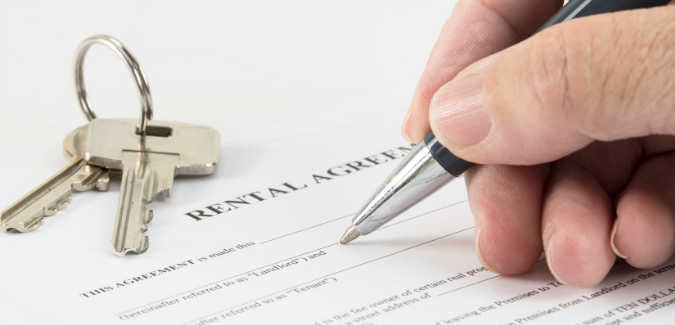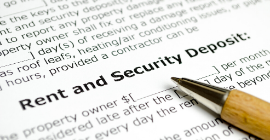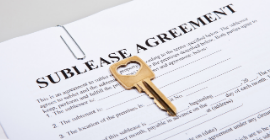Understand Your Lease Before You Sign

A lease is a legally binding document, so take time to thoroughly review your lease before signing it. If you do not understand a clause within your lease, you should ask your landlord for clarification or reach out to us at Off-Campus Student Services for further assistance.
Signing a Lease
Leases are required to follow the state’s rental laws but can vary in what they permit you and your property owner to do or not do. It is never good practice to sign a lease without knowing what it says. The following are several essential points you can expect to find in a lease.

Security Deposit
A security deposit is a one-time, refundable sum of money that a landlord collects in the event of unexpected damages or missed payments. A specified amount of money required for the security deposit should be clearly stated within the lease, as well as any conditions for its return.
A security deposit is typically equal to one month's rent, though in some cases, it can be up to 1.5 times the monthly rent. This deposit serves as a safeguard for the landlord against potential damages or unpaid rent.
- When to Pay: The security deposit is usually paid after you sign the lease agreement but before moving in. This payment ensures that the property is reserved for you and demonstrates your commitment to the lease terms.
Things to Keep in Mind:
- Documentation: Obtain a receipt for your security deposit payment and ensure it is documented in your lease agreement.
- Inspection Report: Conduct a thorough move-in inspection with your landlord to document the condition of the property. This can help avoid disputes about damages when you move out.
- Deposit Return: Understand the conditions under which your security deposit will be returned. Typically, it is refundable at the end of your lease, minus any deductions for damages or unpaid rent.

Rental Payments
The lease should indicate the exact amount of rent and how often it is paid (i.e., weekly, bi-weekly, or monthly). Be sure it also includes information on late fees, how fees are assessed, how rent must be paid, and any other conditions for paying your rent.

Lease start date and end date
The start date is the first day of your lease, and the day you assume responsibility for the apartment. The end date is the last day of your lease, and the day you need to vacate the premises or sign a new lease. The start and end dates show the duration of your lease, which means it is active only for this period of time. With an active lease, you are obligated to pay the rent. The property owner cannot lease the apartment to anyone else during this time. Be sure you understand any terms for signing a new lease or moving out. If you sign a month-to-month rental agreement, it should indicate when the lease begins, and how much notice you must give before terminating the agreement and moving out. With a regular lease, property owners must go through a formal eviction process to require you to move. However, with a month-to-month agreement, the property owner can ask you to move at any time as stated in the agreement. Also, be sure you understand the terms for terminating a lease before the end date. Early termination requires some kind of penalty; knowing your responsibilities before you sign will help minimize any surprises later.

Utilities
Another important thing to consider besides your rent is what other bills you must pay — such as the water, gas, electricity, and internet — and what happens if you don’t pay them. Some utilities may be included in your rent costs, or your landlord may be responsible for some of them. Some leases include this information in a section with check boxes that indicate who is responsible for what. If “tenant” is checked under electric and gas, for example, you are responsible. And if you don’t pay on time or at all, some leases may say you are in “default,” meaning that you’ve broken your lease and can be evicted.

Policies
If pets are not allowed on the premises, if friends or guests can visit only during specific hours, or if waterbeds are not allowed, these provisions should be stated somewhere in the lease. Other potential stipulations that should be clearly stated include policies about painting, wallpapering, hanging pictures, or making any other changes to the apartment. If something is not stated, be sure you get a written addendum (an additional agreement) before making alterations to the apartment. Your lease may also address visitors and how long they can stay. Some leases may require a visitor to start paying rent after a certain period of time. Policies on repairs, subletting, rental insurance, and other requirements should also be listed in the lease. Remember, when you sign the lease, you agree to abide by all the policies stated.

Landlord’s right of entry
This section of your lease will explain the conditions under which a property owner may legally enter your apartment, whether your permission is required, how much notice you must be given, and any other specific details. In emergency situations, most states give property owners the right to enter your apartment without notice; however, the more information you have in advance, the better. What is the landlord's right of entry in PA? In Pennsylvania, a landlord must give reasonable notice before entering a property – usually, 24-hours advanced notice. There needs to be written notice – if emergency repairs are needed, landlords can enter the property to stop any damage that is occurring.
Lease Provisions to Look Out For
AS IS clause: Landlords will commonly include an “As-Is” clause in the lease. The “As-Is” clause says that the tenant accepts the property “As-Is.” The property owner argues that the tenant accepted any dangerous conditions on the property. The property owner will then use the “As-Is” clause in litigation to argue the tenant cannot sue the property owner. In other words, a property owner cannot provide a tenant with a property that is unsafe or is not fit for human habitation. Also, a property owner cannot force a tenant to accept a leased property that is unsafe or is not fit for people to live in. A property owner cannot force a tenant to waive this warranty.
Jointly and Severally: When you have more than one student signing a lease is considered jointly and severally: When you sign a lease and agree to “joint and several liability,” you are agreeing that you are each fully responsible for the full amount of the rent, for fulfilling all conditions of the lease, and for any damages to the rental. What this means is that if one of your housemates decides to move out in the middle of the year without finding a replacement tenant, your property owner can still require that you pay the full rental amount, not just the portion that was agreed upon between you and your housemates. Also, if you decide to break your lease early and a court finds you did not have a valid reason to do so, your property owner can seek to recoup the money for the rest of the lease term from either one or all of you. This also means that if there is damage to the rental, the property owner can hold you all responsible, even if only one of your housemates caused the damage.
Severability Clause: This clause states that if one portion of the lease is ruled invalid in court, the rest of the lease is still upheld. If you have added a new clause that is then ruled as invalid due to local landlord-tenant laws, then this clause can ensure your lease agreement is still valid.
Automatic Lease Renewal: This clause automatically renews your lease. Instead of having to sign a new lease, it is understood that the lease will automatically renew for the same rental term, whether it is six months, one year, etc. It usually specifies in the lease 60-90 days before lease ends you need to contact property owner or property manager if you would like to renew lease
Landlord Unable to Give Possession: In the event Landlord is unable to give possession of the Premises to Tenant on the start date of the Term, Tenant will not be liable for rent until after Landlord gives possession of the Premises to Tenant. This does not affect the end date of the Term.
Waiver of notice or Notice to Quit: A property owner may evict renters for nonpayment of rent. Rent in Pennsylvania is considered late a day past its due. Before a property owner can start filing an eviction, the property owner must give the tenant a 10-Day Notice to Quit. This eviction notice allows the tenant 10 days (about 1 and a half weeks) to settle any unpaid rent.
What is the difference between sublet and relet? Each rental agreement type has its disadvantages. If you sublet, you are responsible for any damage caused by the subtenant and will have to pay up if the person you are subletting to does not pay their rent. If you relet, you will have to pay rent (even after breaking your lease) until a new resident is found. All situations are different when sublet or relet occurs, please discuss with the property owner, or refer to your rental agreement.
Can property owners make tenants pay for repairs: A property owner can make a tenant pay for repairs if they clearly state in their lease that certain repairs will be the tenant’s responsibility. If this clause in the lease abides by state laws, then yes, the landlord can legally make a tenant pay for repairs. If a tenant refuses to pay for repairs, then they will be breaking their lease, therefore it is within your right to start the formal eviction process. Keep in mind that the cost of repairs may be deducted from the security deposit. If the security deposit does not cover the damage, you have other options to consider. However, it is always best to have a calm discussion with tenants and give them their options before making any rash decisions.
Are property owners responsible for providing smoke detectors: In Pennsylvania, property owners are required to install smoke detectors that meet the operating requirements of the Department of Labor and Industry. Property owners must also install visual smoke alarms, fire alarm systems or carbon monoxide detectors free of charge to the tenant if the tenant is deaf or hard of hearing or is unable to hear a smoke alarm sound. Carbon monoxide detectors must be installed by property owners in any rental unit that has an attached garage, fossil fuel-burning heater or appliance, or fireplace.
Quiet Enjoyment: Under Pennsylvania law, every lease comes with the Implied Covenant of Quiet Enjoyment. That means that you have the right to use and enjoy the rental unit without unreasonable interference by the property owner. However, you must give the property owner reasonable access to the rental unit to conduct maintenance/repairs or show the property to a future tenant. If the property owner takes a wrongful action that interferes with your use and possession of the rental unit, you must notify the landlord and give the landlord a reasonable opportunity to correct the problem.
